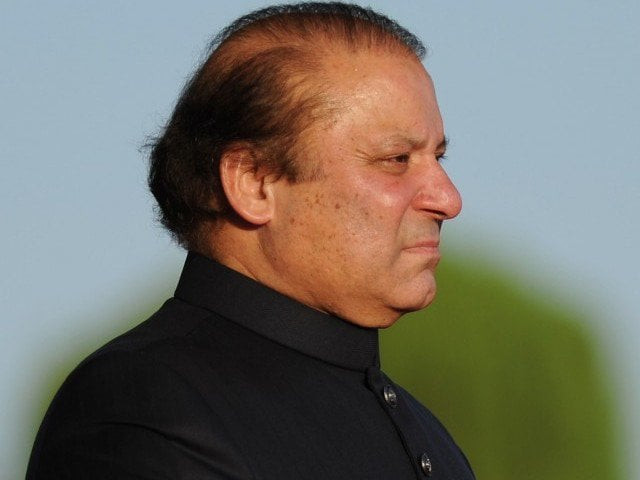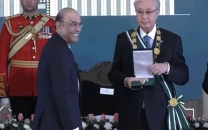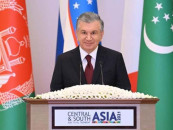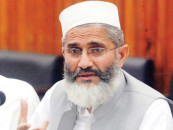PM ‘is not honest with nation’: Justice Khosa
Says PM deliberately suppressed relevant facts or he had conveniently allowed himself to go along with a false story

File photo of Prime Minister Nawaz Sharif. PHOTO: AFP
Justice Khosa, while authoring the 192-page judgment, disqualified the prime minister, but his views belong to the minority opinion and, therefore, have no binding effect on anyone.
The judge observed that the prime minister had deliberately suppressed relevant facts or he had conveniently allowed himself to go along with a false story advanced by his children.
“Apart from that the alternate story about ‘purchase’ of the relevant properties in London propounded by him, which runs completely contrary to the story about acquisition of the said properties on the basis of a settlement of the business in Qatar, had not been substantiated by respondent No 1 (PM) through any tangible material,” he further observed.
The judge wondered that how a PM’s son (Hussain Nawaz), who is settled in Saudi Arabia, with two wives and about half a dozen children, had been sending gifts of millions of rupees in cash to his father on a regular basis, and that too to a father who “is quite rich and very famous”.
Nawaz survives to see another day as SC orders probe into corruption allegations
“This phenomenon is difficult to comprehend.”
The justice, who authored the minority judgment, said: “The PM has failed to produce anything before this court: how the money was generated and transferred to Dubai for setting up a factory there; where the proceeds of the sale of the factory in Dubai were kept or utilised between 1980 and 2000; how the money was generated and transferred to Jeddah for setting up a factory there; and then how the proceeds of the sale of the factory in Jeddah were transferred to London for the “purchase” of relevant properties there.
“No banking transaction and no money trail has been referred to or established by him.”
“Respondent No 1 is our elected representative and our prime minister, and we expected him to take us into confidence in the above-mentioned matters so that he could come out clean in the matter, but unfortunately he has done nothing before us so as to clear his name or confirm his probity, the justice said.
“Apart from that when a court of law requires a person to explain his position in respect of something, particularly when he had himself repeatedly volunteered to explain his position before any court or forum inquiring into the same, his silence before the court or adopting an evasive approach reflects adversely upon his bona fide and honesty in the matter,” he added.
PML-N gets breather, but for how long?
Justice Khosa observed: “The will of Mian Muhammad Sharif has been brought on record by the PM and his children to show as to why and how the entire proceeds of the stated settlement of the real estate business of late Mian Muhammad Sharif in Qatar had been handed over to his grandson who was not his heir and all the heirs of the deceased had been deprived of such proceeds. The family settlement qua inheritance of late Mian Muhammad Sharif had come about in the year 2009.
“There was, thus, a real likelihood that the relevant properties in London had actually been purchased or acquired by the respondent No 1, but [the] ownership of the same had been shown in the name of one of his sons, namely Mr Hussain Nawaz, and that respondent No 1 has not been honest in his oscillating and vacillating explanations advanced in that respect at different stages.”
Justice Khosa observed that money laundering was an allegation which was not new to the PM and his close relative Ishaq Dar.
“I understand that a lot of effort must have gone into digging out the relevant details and a lot of resources of the state must have been consumed in the entire exercise. I have, however, felt agonised by the fact that the matter had later on been hushed up, brushed under the carpet and never pursued by any quarter with the result that the facts asserted in that report could not be ascertained or verified by any court of competent jurisdiction. It appears that politics had trumped accountability and discretion had the better of public interest.”
Panamagate judgement leaves Ishaq Dar in tight spot
Justice Khosa says that when persons in high-public offices brazenly and unabashedly cling on to offices or power despite having been involved or implicated in serious scandals of corruption or immoral conduct, impairing their high moral authority, then the only way to oust or drive them out is to provide for a legal mechanism for their ouster and this is probably why in our country suitable provisions had been introduced in Article 62 of the Constitution and the relevant election laws through appropriate amendments.
“The issue of corruption and corrupt practices is essentially a criminal law issue but when it arises in the electoral context of a constitutional or statutory qualification or disqualification, then such an issue becomes a quasi criminal issue,” the justice wrote in his judgment.
“When dealing with a quasi criminal issue, it is impossible not to be guided in the matter by the broader principles applicable to the criminal law relating to corruption and corrupt practices which are inseparably linked with the issue of honesty of a person. As seen above, one of the basic features governing this field of the law is that where a public servant or a holder of a public office is in possession of an asset -- either directly or through his dependents or Benamidars -- then it is for him to account for that asset which is disproportionate to his known sources of income and a court dealing with the issue is to presume the absence of a satisfactory explanation.”
The judge observes that corruption at high places is not new, but the methods of corruption and concealing the proceeds of corruption have seen a dramatic change in recent times.
“Previously a corrupt official would make illegal money and then put the amount in his bank account or a bank account of someone close to him or would convert that amount into property.
“Such proceeds of corruption and the property acquired through the same were not difficult to detect and; therefore, the normal onus and standard of proof required in a criminal case, ie, the prosecution to prove its allegations beyond reasonable doubt and the accused person presumed to be innocent till proved guilty were applicable to the cases of corruption as well,” the justice observed.
“Things have, however, changed now. There are now tax havens available in different parts of the world and through creation of offshore companies not only tax is being evaded by concealing wealth, but even ill-gotten money is parked behind multiple veils of secrecy which are extremely difficult to lift or penetrate,” he adds.
Justice Khosa believes that the new development has forced legislatures around the world to modify the laws about the onus and standard of proof in cases of corruption and even courts and tribunals in different parts of the world are adopting different approaches for concluding as to whether the allegations of corruption leveled against an accused person have been established or not.
Justice Khosa observed that Nawaz Sharif had held the highest public offices since 1981 and in one of his interviews he had stated that he had decided to disassociate himself from the family business in 1997, although no material has been produced before us in support of such a claim.
“There is no denying the fact that at least between 1981 and 1997, the said respondent was actively engaged with his family business and was simultaneously enjoying the above-mentioned highest public offices. It is also an admitted fact that the relevant two offshore companies own the four properties in London from the years 1993/1996, which offshore companies are statedly owned by [the] Respondent No 1’s son, namely Mr Hussain Nawaz Sharif at least since the year 2006. The dependent and non-earning children of the Respondent No. 1 are admittedly in possession of the said properties in London since the years 1993/1996 and, thus, it is the respondent No 1 who is deemed to be in possession of those properties since the years 1993/1996.
“Nothing has been produced before this court either by the respondent No. 1 or his son to show that before the year 2006, the said offshore companies and the relevant properties were owned by somebody else.”
The judge says it is more likely than not that the said companies and properties were set up or taken over at a time when respondent No 1 was holding the above-mentioned highest public offices in Pakistan.
“Against this backdrop, a serious issue arises as to whether the PM has been an ‘Ameen’ while in charge of the resources of the motherland or not.”
He further says that all other courts in this country are courts of law whereas the SC is not just a court of law but also the court of ultimate justice.
Imran, Zardari demand PM Nawaz's resignation
The order referred to Plato’s statement that for the position of the king he would prefer a philosopher over a merchant because a philosopher is a visionary thinking about the future whereas a merchant may find it impossible not to keep his mundane business and property interests in mind even when administering the republic. “Plato was indeed a wise man.”
Justice Gulzar Ahmad, while endorsing Justice Khosa’s declaration, has noted that the PM did not make a clean breast and provided nothing to the court where it could have fairly concluded that “yes, Mian Muhammad Nawaz Sharif has nothing to do with these four London Flats”.
“Being faced with this scenario, the court cannot be expected to sit as a toothless body and become a mere spectator, but it has to rise above screen of technicalities and to give positive verdict for meeting the ends of justice and also to safeguard the fundamental rights of the people of Pakistan.
“It is thus declared that Mian Muhammad Nawaz Sharif has not been Honest and Righteous in terms of Article 62(1)(f) of the Constitution and thus rendered himself disqualified from holding the office of a member of the National Assembly and ceasing to be the prime minister of Pakistan,” he observed.



















COMMENTS
Comments are moderated and generally will be posted if they are on-topic and not abusive.
For more information, please see our Comments FAQ